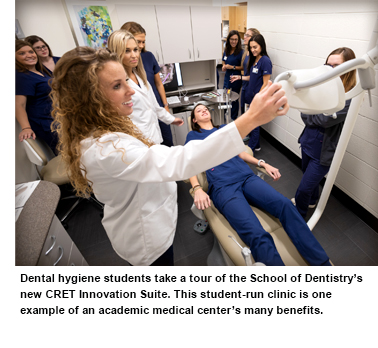The Value of Academic Medicine
Good morning!
I hope everyone had a wonderful Fourth of July holiday that included family time, picnics, fireworks or well-earned rest. For those who spent that day on the job, thank you, and I’m sure our patients thank you, also.
Today, I’d like to underscore the important role that academic medical centers and teaching hospitals play in improving our nation’s health and well-being. Since 1955, UMMC has been educating students who, after graduation, fan out across the state, bringing health care to those most in need.
 We are the education and training site for the only dental, physical therapy, occupational therapy and population health programs in the state. Our patients are taken care of by teams consisting of learners and faculty from the School of Nursing, the School of Dentistry, the School of Medicine and others, and our graduate students in the health sciences work alongside experienced researchers in clinical and basic science settings.
We are the education and training site for the only dental, physical therapy, occupational therapy and population health programs in the state. Our patients are taken care of by teams consisting of learners and faculty from the School of Nursing, the School of Dentistry, the School of Medicine and others, and our graduate students in the health sciences work alongside experienced researchers in clinical and basic science settings.
As the state’s only academic medical center, we have a calling to make patient care accessible beyond our campus, especially specialty services not found in most Mississippi communities. One example of that is our business venture involving Merit Health Madison announced Wednesday. It opens the door for our physicians to perform surgeries and deploy their unique health care capabilities at Merit Health’s hospital in Madison County, bringing the care provided by an academic medical center closer to more Mississippians. And, it promotes efficiency at a time when operating room space, hospital bed space, and clinic space on the main campus is in need of expansion. Additional and enhanced training opportunities will be realized through this relationship.
Life-saving medical innovations and advances have been pioneered at institutions like ours, providing milestone breakthroughs in medicine and patient care of the last century. Researchers and physicians at UMMC are included in that history. Dr. James D. Hardy and his surgical team became the first to successfully transplant a lung from one human to another in 1963, proving to the world that lung transplantation can provide effective therapy for pulmonary diseases that could be otherwise fatal.
He followed that, in 1964, when his team transplanted the heart of a chimpanzee into the chest of a dying man, setting the stage for all future human heart transplantation.
Both of those breakthroughs are examples of how academic medicine goes further than caring for patients and training new health care professionals to take on the charge of discovering and proving new ways to heal. It’s our responsibility, and our mission, to care for the sickest and most medically complex patients and to give Mississippians the best quality of life we can. I gained invaluable, first-hand experience carrying out that mission during my education and training in our School of Medicine and as an Emergency Department physician here. That’s part of the magic of schooling and working at an AMC: We put into action what we learn through hands-on care and research, always putting the patient first.
Our health science students and residents have a rich learning opportunity as they team with faculty to deliver critical and trauma care in a rural state coping with poverty and chronic diseases such as hypertension and obesity.
You can find School of Pharmacy students rounding with critical-care physicians in our ICU tower, and students in occupational and physical therapy from the School of Health Related Professions performing patient care assessments as part of their clinical rotations.
You can find students from a number of our schools side by side with faculty in our research labs or simulation center, studying triggers for opioid addiction or practicing innovative robotic surgery, gaining experience that only a health science center can best afford them.
Our students also learn from UMMC’s veteran emergency responders, physicians and nurses who save lives as a national leader in crisis response, especially in Mississippi. An emergency response team from UMMC was one of the first to arrive on the Mississippi Gulf Coast in the hours after 2005’s killer Hurricane Katrina. Their mission was to survey damage; that quickly changed as they treated the many wounded with whatever meager resources they could find.
I’m so proud of our Emergency Services and its role in disaster management, community education and medical care and coordination. Our new Mississippi Center for Emergency Services, a facility any institution would be proud to claim, will extend our outreach and mission.
Did you know that, according to the Association of American Medical Colleges, patients treated at teaching hospitals have up to 20 percent better odds of survival than those treated elsewhere? And although they represent just 5 percent of the nation’s hospitals, the major teaching hospitals make a huge contribution to the nation’s health care, and that dominoes as doctors they train go on to provide cutting-edge care in their communities.
In myriad ways, academic medicine plays a critical role in our state and nation. Whether it’s educating the next generation of health care professionals, pioneering medical discoveries, or providing high-quality patient care, UMMC, every day, helps lead the way as we strive to create A Healthier Mississippi.



